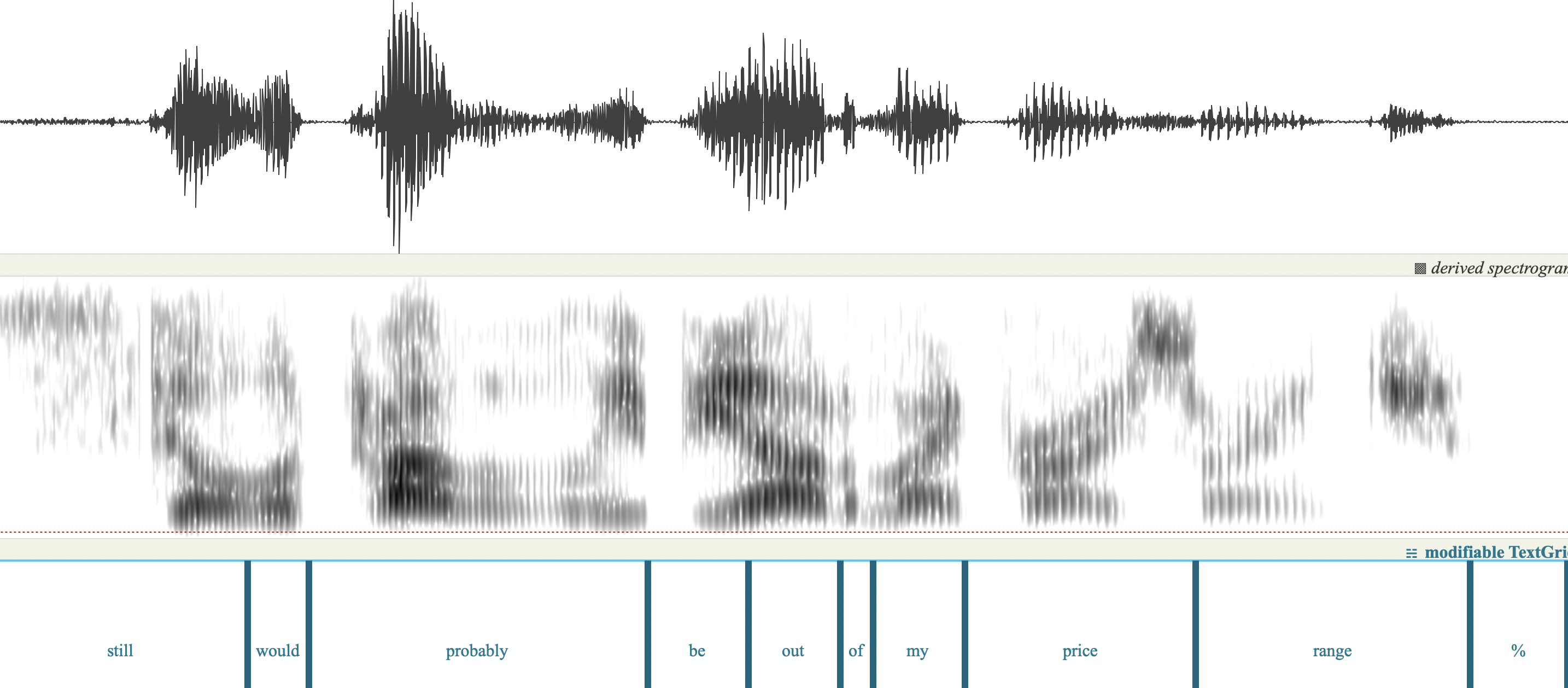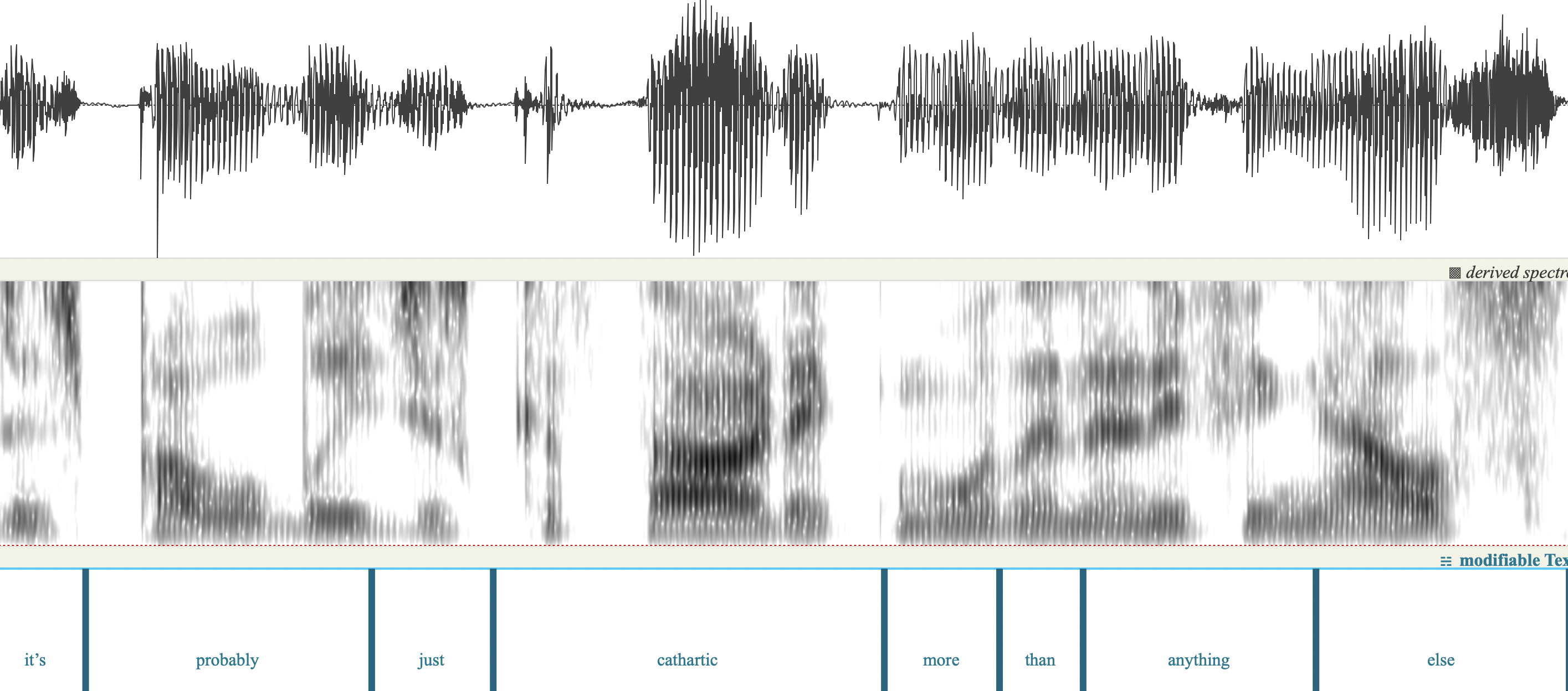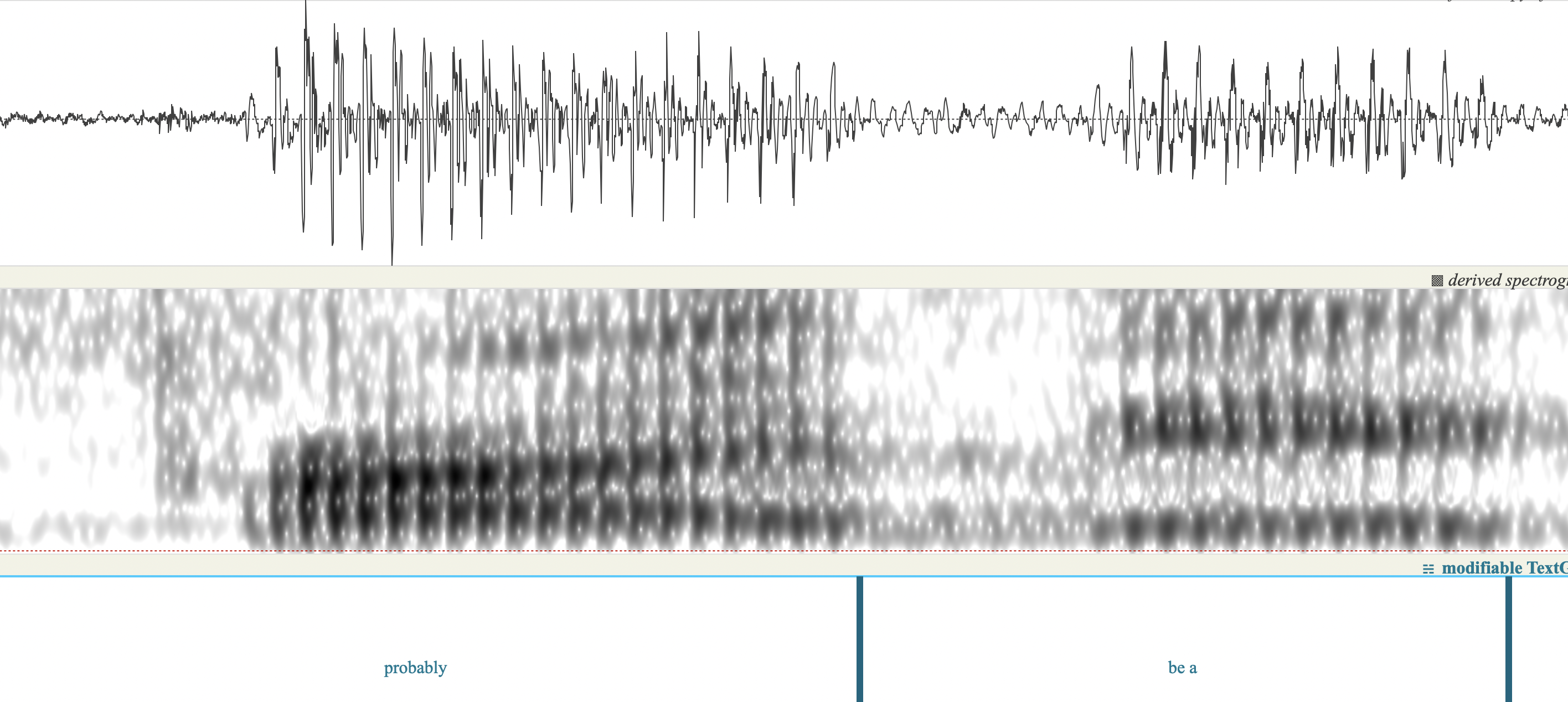More probably
« previous post | next post »
This post is following up on "Probably", 8/11/2024, which sketched the spectrum of probably pronunciations, from the full version with three clear phonetic syllables and two full /b/ stops between the first and second and second and third syllables, to a fully-lenited version with just one phonetic syllable and no residue of the intervocalic consonants:
But as that post noted, there are many variants in between, and this post will exhibit a few of them.
Here's one with the two intervocalic onsets still there, but lenited to the status of approximants rather than stops:
(From Morning Edition in 2009…)
And here's one where the first /b/ is totally gone, but the /bl/ is rendered with a full stop gap:
Zeroing in on "probably":
And just the "proba-" part, illustrating the loss of the first closure, and sounding in isolation more like "pow":
(That general pattern — rendered as something like "probly" in eye dialect — is by far the most common one, at least in my little random sample of 100. This example was from All Things Considered in 2010.)
Here's another monosyllabic version, from President Barack Obama in in 2010:
Zeroing in:
Here's one, from All Things Considered in 2007, where the first intervocalic stop becomes an approximate, and the /bl/ is reduced to just a weak /l/ — "probally" in eye dialect:
And zeroing in on "probably":
And finally, here's an example (from Weekend Edition in 2013) of the case rendered in eye-dialect as "prolly" — which was actually rather rare in my sample:
A bit closer:
And just the word "probably":
There are plenty of other variants Out There — reinforcing the point, made many times in these posts, that most aspects of allophonic variation are not symbolically mediated.
And as noted before, this leaves open the question of what contextual and dialectological factors influence the dimensions of variation.





Laura Morland said,
August 14, 2024 @ 9:27 am
Fascinating!
I would add that there's an *intentional* pronunciation of the word that was very popular in the 80s and early 90s that I found myself using just last week:
Used always as a single-word response, its stress on the third and final syllable:
prob-ub-LEE.
Does anyone else here know this variant?
KC said,
August 14, 2024 @ 10:21 am
My brain is either messing with me or I can still hear, if not three distinct syllables, two changes in tone in Barack's version that make it sound polysyllabic. Similarly, other examples just don't sound less than full until truncated to just the syllables for "probably" with zero context.
I think the brain just fills in the syllables to make the sound fit an idealized form. And if it's happening on both the speaker and the listener side I can see how some people just don't notice this at all, like a file being automatically compressed before being emailed and decompressed upon receiving it.
Mark Liberman said,
August 14, 2024 @ 11:01 am
@KC: "I think the brain just fills in the syllables to make the sound fit an idealized form."
…known as (or at least related to) the "phoneme restoration effect"…
Xtifr said,
August 14, 2024 @ 11:53 am
@Laura Morland: Yes, now that you mention it, that does seem quite familiar.
Cervantes said,
August 14, 2024 @ 1:20 pm
Of course these sometimes become lexical. We can catch phrases in the act, not just single words, e.g I believe "gonna" can be found in many dictionaries. Also "dunno," "wacha" (as in wacha gonna do?). Many standard words are contractions of phrases, some retaining the apostrophe to remind us, others not. Woodenchanoit.
Philip Anderson said,
August 14, 2024 @ 1:43 pm
@Cervantes
Phonetic spelling has often been used to show “uneducated” speech, and I think some words, like ‘gonna’, ‘wanna’, ‘dunno’ became so common they were lexicalised.
‘Whodunit’ goes back to the 1930s.
David Marjanović said,
August 14, 2024 @ 1:52 pm
Who 'd 'a' thunk it…
Cervantes said,
August 14, 2024 @ 2:40 pm
I think whodunit may be a deliberate portmanteau. That's somewhat different.
Philip Taylor said,
August 14, 2024 @ 3:06 pm
I agree that "whodunit" is probably a deliberate portmanteau formation, but its central element is (a) obviously ungrammatical, and (b) intentionally mis-spelled, so I wonder why those who formed the term did not form it as "whodidit" — the same number of letters, but totally unexceptionable with the exception of the elimination of word boundaries …
Barbara Phillips Long said,
August 14, 2024 @ 5:14 pm
My junior high English teacher was fanatical about the “proper” pronunciation of the words horrible, Tuesday, and February. “Probably” would have been another she might have added to her lectures and drills. (Side note — I have only just realized how a couple of this teacher’s practices helped lead to my interest in linguistics.)
Which leads me to wonder if there is a good collection of school textbooks from over the years that would show which words were of concern in U.S. public education. I am pretty certain February has long been a bugaboo for English teachers. It would be interesting to know if “probably” has appeared in lessons on pronunciation.
JPL said,
August 14, 2024 @ 6:32 pm
@BPL:
If a person says, "horble", they're probably from Wisconsin. (That's what I've noticed anyway.)
Barbara Phillips Long said,
August 15, 2024 @ 1:34 am
@JPL —
That’s interesting. I don’t think that pronunciation is limited to Wisconsin, and I may have been guilty of it myself. (I grew up in upstate New York.)
My teacher’s focus was on the first vowel, which she said should not be pronounced as an O, but more like an AH sound. Most of my classmates found this as baffling as I did, but years later I wondered of she thought the Rs following the O should influence the vowel.
Having listened to a few pronunciations online a while back, I wonder if her opinion was affected by a British English pronunciation, although I doubt her preferred pronunciation was actually British.
Yves Rehbein said,
August 15, 2024 @ 3:32 am
As for "prolly", the quality of the audio makes it difficult to tell if there is affrication which would be expected in view of the pair probe / prove. I do wlnder if *probly is simply proben + -ly. At a first glance I can't confirm that that was a productive derivation pattern, but then there's clmfortably comfy. Thst would be moroho-phonology or morphonology for short.
As for "pry" in a similar vein I wonder if there is a, uhm, probable relation to German un-ge-fähr "approximately" modulo Grimm's law. Since we also have "per say" in lieu of per-se, anything seems possible after all.
Cervantes said,
August 15, 2024 @ 7:36 am
I remember my fourth grade teacher complaining about sloppy pronunciation, and giving the specific example of "jeet jet?" which in case it isn't immediately obvious means "Did you eat yet?"
As long as we're on the subject, I would say that the more or less standard pronunciation of "comfortable" is "comftorble." Obviously Wednesday long ago became Wensday and without even looking it up I presume that's what Merriam-Webster gives. But the spelling stays frozen even as the pronunciation changes.
Philip Anderson said,
August 15, 2024 @ 6:02 pm
When I was growing up in the English West Country, not far from Bristol, local TV showed a series of programmes about Krek Bristle (Correct Bristol), highlighting local phrases.
http://www.derekrobinson.info/derekrobinsonpage7.html
What could be more romantic than “beetroot chew” (be true to you)?
Barbara Phillips Long said,
August 15, 2024 @ 8:05 pm
Reddit has some commentary on “horrible” aka “hawrible”:
https://www.reddit.com/r/AskAnAmerican/comments/16zr05u/which_american_accentdialect_says_the_word/
And “probably” has several Reddit entries also, but I did not see anything I thought would add to this discussion.